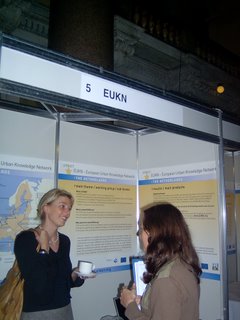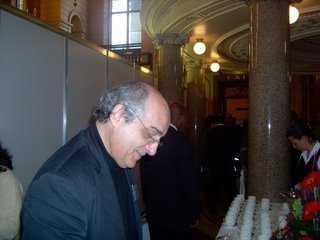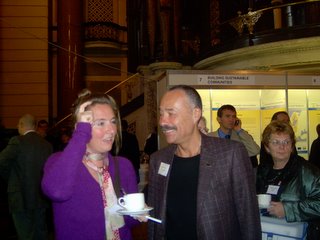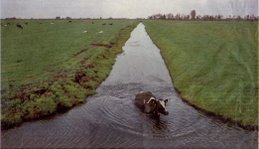URBACT: European City Networks Energised!
Once upon a time…, 15 years ago, we started bringing together countries and cities, their governments and their authorities, their officials, their neighbourhood regeneration professionals (project team leaders and –members) and representatives of the local voluntary sectors. And scientifics: spatial planners, sociologists, architects, community social psychologists, economists etq. Few people from the private business sector, but even they were present. But what happened all the time at big international meetings like the one I participated in yesterday and today? Discussions were badly structured, information was inefficiently shared, practitioners were not heard. And that, in spite of extensive preparations in the shape of exchange visits, mainly by local professionals and inhabitants’ representatives, monitored by scientific staff. Those mini-scale meetings, trainings and exchanges were a greater success than we could hope for: people who felt isolated, and were marginalised, suddenly discovered colleagues and fellow-believers in emancipation-by-doing. A learning process started there. Big official European meetings created more frustration than inspiration.
Great 19th century Liverpoolers looking down on the URBACT meeting in the megalomaniac St.-George Hall on the acropolis of that city…
The dominating structure (or the lack thereof) of this cooperation was: the Network. A network can be anything. Anything between a mafia and an information exchanging ring of university researchers. Now, under impulse of the French City policy people, Eurocities and other pre-existing networks, the City networks have been energised into real-life laboratories of collecting, refining and codification of urban knowledges. This was done by URBACT: a Paris secretariat linked to the Délégation Interministérielle à la Ville (DIV, located in Saint-Denis) that coordinates systematic, but polymorphic, knowledge-generation through monitored trajectories of exchanges between cities from all EU countries. Many of this pre-existed: Quarties En Crise, Eurocities thematic networks, comprehensive scientific researches. But is was too dispersed, too ad-hoc, too soon forgotten.
Today, I participated in a working group, where different thematic networks reported midway about their findings on the subject of citizen participation in local public management. For one network (the Rome-led PARTICIPANDO), this is a main theme, for the others (immigrants, IT-communication, young people, security, business, etc.) it is an essential part of their thematics. This exercise in “cross-network” exchange turned out to be extremely fruitful and to-the-point. I will report about this participation subject, especially in its relation to policy and management decisions, in a larger document, to be published on my website .
 Our Dutch pride: the EUKN web-based urban knowledge treasure was well represented. (Fleur Boulogne of the Dutch Home Office explains EUKN to a visitor).
Our Dutch pride: the EUKN web-based urban knowledge treasure was well represented. (Fleur Boulogne of the Dutch Home Office explains EUKN to a visitor). Urban research veteran Claude Jacquier (CNRS, Grenoble) is a fine internationally-oriented researcher and teacher.
Urban research veteran Claude Jacquier (CNRS, Grenoble) is a fine internationally-oriented researcher and teacher. Mr. Bob Ledsome, outgoing president of the international URBACT Monitoring Committee and leading official at the British Office of Deputy Prime Minister John Prescott contributed about a too-little known aspect of UK urban market-driven policy: its care for sustainable communities. (No photo).
 I discovered quite a few fellow-Dutchmen and –women, like Cleo Pouw and Benji de Levie from Rotterdam, who contributed expertly to this European forum, not to speak of Maarten van Bemmelen, a really internationilised Rotterdammer, living in Spain, who is an expert of the URBACT Secretariat. Without their contributions, the European Union as a caring governmental body about cities, would be different and surely not be better off than now.
I discovered quite a few fellow-Dutchmen and –women, like Cleo Pouw and Benji de Levie from Rotterdam, who contributed expertly to this European forum, not to speak of Maarten van Bemmelen, a really internationilised Rotterdammer, living in Spain, who is an expert of the URBACT Secretariat. Without their contributions, the European Union as a caring governmental body about cities, would be different and surely not be better off than now.By mid-2006 the different thematic trajectories will result in documents, training courses, information exchange systems and many other tools for the urban regeneration workers. It is a shame, that, just now, the European Union (DG Regional Development) is more and more taking leave of its policy of support to urban interventions. Urban policy is turned into a subtheme, without much enforcement, of regional massive investment, as far as the planning for 2007-2013 by the actual European Commission is concerned. The managing and steering role is relocated to one or more national governments. In the budgetary proposals, no funding is earmarked for cities. And, given the budgetary deadlock between governments, all financing is stalled anyhow.
Cities are the only imaginable locations for a web-based competitive knowledge society as was projected in the 2000 Lisbon objectives. If cities are left alone, in favour of monster subsidies to international agro-industries and big farmers, datafarming will emigrate to China and India and the big European urban agglomerations will turn into 21st century Bombays, Calcuttas and Rio de Janeiros. URBACT proves, now already, that a relatively small investment into cities, may produce an enormous added value, provided, the money is spent on emancipation, on people.
Goodbye to Liverpool. Plane early tomorrow.
Your urban traveller goes to Amsterdam, next Thursday.





No comments:
Post a Comment